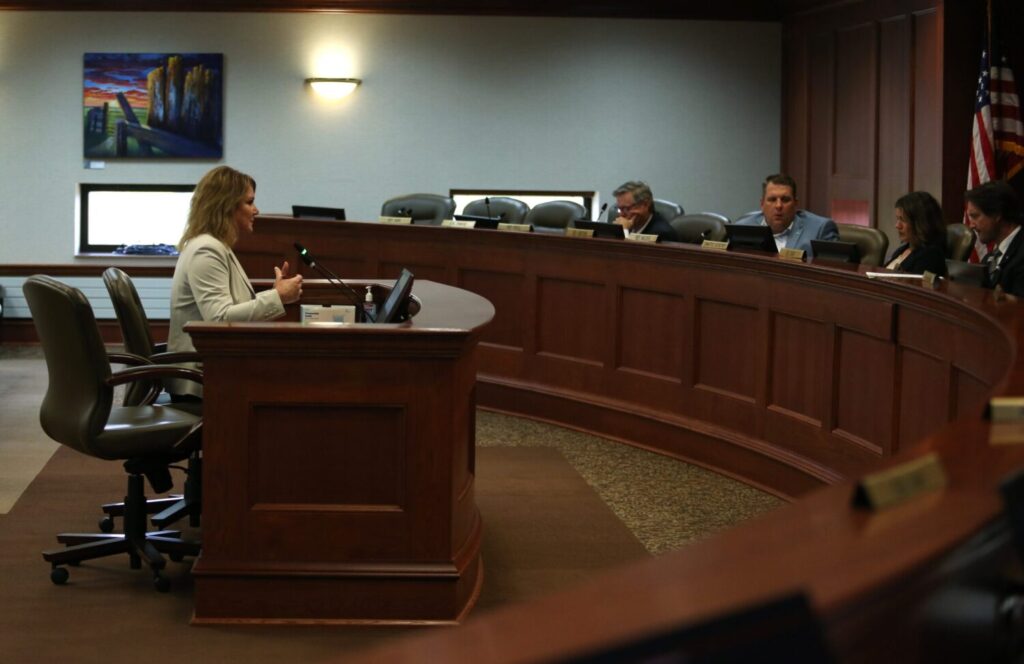
(Makenzie Huber/South Dakota Searchlight)
PIERRE — Proposed federal staffing standards for nursing homes that accept Medicaid would be catastrophic for South Dakota facilities, industry representatives warn.
The South Dakota Association of Healthcare Organizations and South Dakota Health Care Association both presented information to legislators at Thursday’s committee meeting at the Capitol on the sustainability of long-term care in the state.
The rules would require a registered nurse be on duty 24/7 – up from the current requirement of eight hours a day, seven days a week – and would require facilities have enough nursing staff to provide each resident with at least 0.55 hours of registered nurse care and 2.45 hours of nurse aid care every day.
Just over 5% of South Dakota nursing homes currently meet the proposed minimum staffing standards, explained SDHCA Executive Director Mark Deak. That would mean around 95% of South Dakota facilities would have to hire additional nursing staff.
The Centers for Medicare and Medicaid Services estimate around 75% of nursing homes in the United States would need to increase hiring to achieve the minimum staffing requirements.
The standards would add to burdens nursing homes have faced in recent years, including high costs due to pandemic-related regulations and hiring travel nurses to fill open positions, plus low state reimbursement rates for Medicaid, said SDAHO Chief Operating Officer Tammy Hatting and Deak.
“This really is a disaster waiting to happen,” Deak said. “The folks we need to be in long-term care are not there to hire. This rule has no money attached to hire them.”
The standards are intended to strengthen staffing requirements to provide safer, more quality patient care, balancing the changes against the “practicalities of implementation and costs,” according to CMS. While well intentioned, Hatting said, the rules would add more red tape to an industry that’s already wrapped in it.
“The staffing mandate will lead to nursing home closures,” Hatting told South Dakota Searchlight. “We’re already having a hard time staffing positions and now they’re coming in and forcing an unfunded mandate. Rates will go up, which means people won’t be able to afford nursing home care through private pay, and more people will end up on Medicaid. It’ll end up costing everybody more money: the nursing homes, the patient and the state.”

Eighteen nursing homes have closed in South Dakota since 2015, often citing workforce and reimbursement issues. Three South Dakota nursing homes have closed or have announced they plan to close so far in 2023.
Hatting said her organization will push back on several aspects of the proposed standards, including:
- Removing the 24/7 registered nurse requirement – or at least providing funding and allowing nursing facilities to use telehealth alternatives.
- Including licensed practical nurses, in addition to registered nurses, in the staffing requirements. The proposed rule doesn’t include requirements for licensed practical nurses, though South Dakota nursing homes rely on them regularly.
- Redefining which communities are “rural.”
Urban facilities would have to comply with the new standards along a faster schedule than rural facilities. “Urban” nursing homes under the CMS proposed language would not only include South Dakota’s largest cities like Sioux Falls and Rapid City, but also nursing homes in Alcester, Lead, Marion and New Underwood.

Deak added that the standards would “obliterate” recent accomplishments made by the state. The Legislature last winter approved an increase to a 100% Medicaid cost reimbursement rate for community-support providers that rely on government funding, such as nursing homes. The Legislature revisits and sets reimbursement rates each session.
The increase infused $49 million into nursing homes, according to the Department of Human Services. In the first month after the new reimbursement rate was implemented, nursing home reimbursements increased by 28.2%.
Deak said the National Health Care Association plans to send 10,000 comments opposing the proposed standards to the federal government by the beginning of November, when the public comment period ends.
U.S. Sens. John Thune and Mike Rounds spoke out against the proposed standards earlier this year. Hatting said she plans to meet with South Dakota’s congressional delegation this week to further discuss the impact the rule changes would have on long term care in the state.
“CMS issued a tornado warning,” Hatting said. “Tornadoes can wipe out small towns easily. It could veer another way or the weather service could cancel it altogether, but it is impending.”
